

When you try to walk across a moonbow... be very careful!
This is a 30-second exposure of a lunar rainbow over Victoria Falls, with Orion in the background, taken from the Zambia side of the falls. It was taken by Calvin Bradshaw, who kindly put it on Wiki Commons.
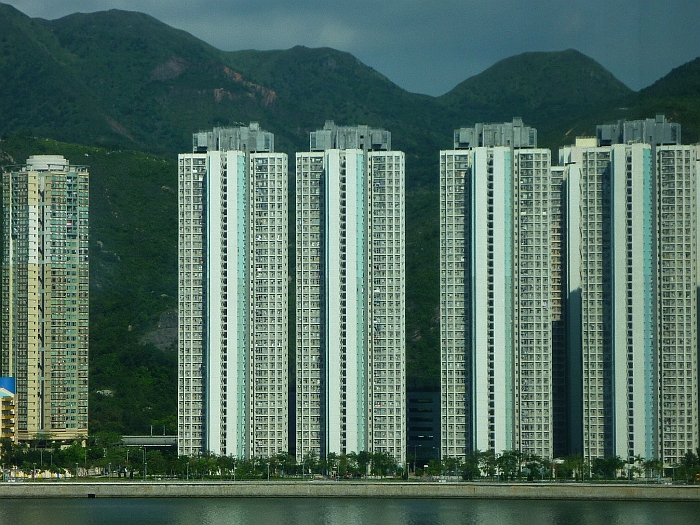
Hong Kong is a far-out mix of old and new, natural and artificial. Lisa and I are giving talks at universities here, and right now we're staying at hotel near Chinese University, which is up in the New Territories, fairly far north from downtown. Our window faces out to Tolo Harbour, and we can see that curious mix of tall apartments and wild mountains that's so common in Hong Kong, and so rare elsewhere.
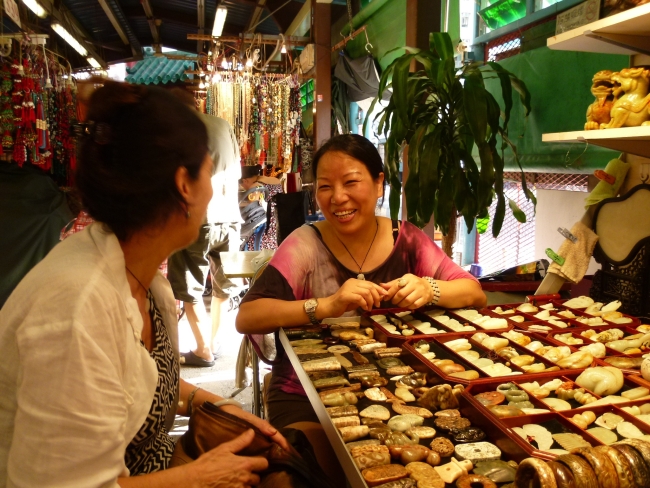
After getting to Hong Kong yesterday, Lisa and I went to the jade market in Yau Ma Tei, which is a dense urban area in Kowloon, the peninsula across from Hong Kong Island. The woman she knew before spotted us before we saw her. We spent two hours carefully looking through all the pieces here, and bought a small carving of Guanyin, good for a necklace. Time for Lisa's birthday present!
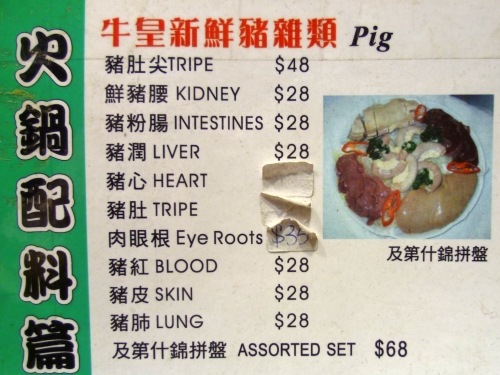
Later Lisa and I walked south to Tsim Sha Tsui and had dinner. We did not eat here. These prices are in Hong Kong dollars, so they're not as bad as they look: divide by 8 to get US dollars. But it wasn't the price that put us off.
There's a famous joke about the characteristics of people in different parts of China, which goes like this:
A man from Beijing, a man from Shanghai and a man from Guangzhou were walking along when all of a sudden, out of the sky, came a flying saucer! It landed, the door popped open, and an alien stepped out.
The man from Beijing said: "You should let me talk to it first. We should find out who their leaders are, and put them in touch with the government."
The man from Shanghai said: "No, you should let me talk to it first. Maybe we can set up trade relations. Just think how profitable that could be!"
The man from Guangzhou said: "No, you should let me look at it. Maybe we can eat it!"
Guangzhou is in southern China, sort of near Hong Kong. It's in southern China that they eat all the most scary stuff.
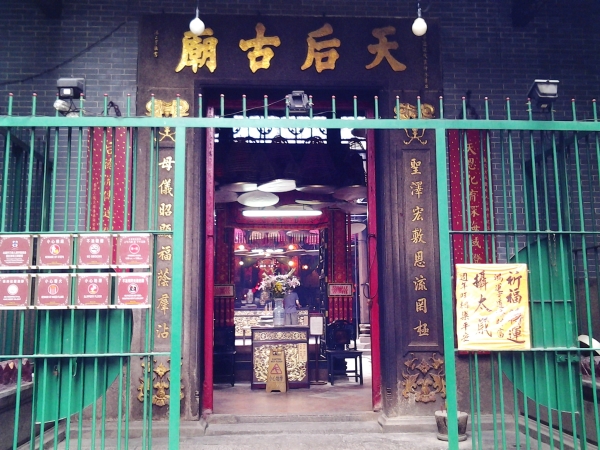
Here's the gate of the Tin Hau temple in Yau Ma Tei, a crowded and busy neighborhood in Kowloon, the peninsula across the harbor from Hong Kong Island. My wife Lisa took this photo.
Tin Hau, also known as Mazu, is the Chinese sea goddess who protects fishermen and sailors. There are temples to her all along the coast — and 60 of them in Hong Kong!
According to legend, Mazu started as an actual girl who wore red garments while standing on the shore to guide fishing boats home, even in the most dangerous storms. This part could even be true, since many Chinese gods are historical figures who gradually got 'promoted' after death, working their way up the ranks until they became gods.
Chinese religion is very syncretic, meaning that it freely combines elements from different sources. Both Buddhism and Taoism have borrowed popular deities from each other to attract devotees to their temples. In order to justify Mazu's presence in Buddhist temples, legends were circulated claiming that Mazu's parents prayed to Guanyin for a son — but Guanyin answered their prayers with the birth of yet another daughter. Guanyin, in case you're not keeping score, is a Chinese female version of Avalokiteśvara, an important male figure in Indian Buddhism. So the idea spread that Mazu was a reincarnation of Guanyin... so there are Buddhist as well as Taoist themes in Tin Hau temples... and there are statues of Mazu in other Buddhist and Taoist temples, too!
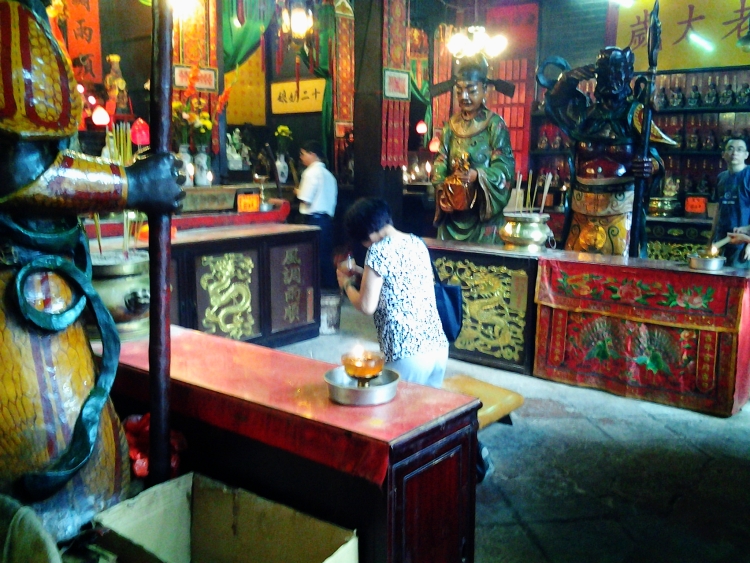
My wife Lisa took this photo of someone doing divination with kau cim sticks at the Tin Hau temple in the Yau Ma Tei neighborhood of Hong Kong.
Chinese attitudes toward religion are different from Western ones and a bit hard for me to grasp. For one thing, most Westerners aren't used to polytheism or religions where believing in a doctrine or creed is not at all the point. I bet some Chinese have trouble grasping Western religious ideas, too. There's recently been a big stir in Hong Kong because some legislators were filibustering — holding up the passage of a bill — for the first time. In the May 25 South China Morning Post, Lau Nai-keung wrote an editorial which begins:
In the Western mindset, filibustering is procedurally correct and therefore lawful. This is based on several thousand years of blind belief that law is ultimately traced to God, and therefore rules should be obeyed and abided by.China, however, is a godless country, and multiple deities provide ethical role models. Laws are judged by whether they are consistent with common sense and are workable. Legality has no overriding authority, and in fact most Chinese believe that rules should be adaptable to changing conditions and not be rigidly fixed.
This description of Western beliefs rubs me the wrong way, and the idea that China is a 'godless country' with 'multiple deities' sounds odd. But I suspect this points at misunderstandings in both directions that are hard to correct.
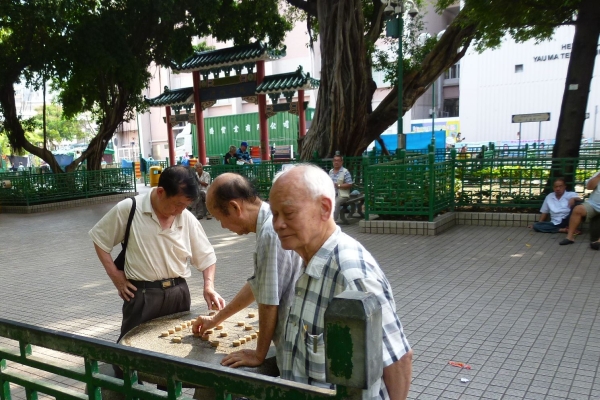
Hong Kong is an intensely modern, commercial place — but there are also many patches of the old Hong Kong still visible. The Tin Hau templed in Yau Ma Tei also houses an altar dedicated to the city god Shing Won and the earth god To Tei, and there are fortune-tellers inside. Outside, there's a park where old folks sit around and — as usual — play cards and Chinese chess! They like it so much, it really makes me want to retire and take up a hobby like that.
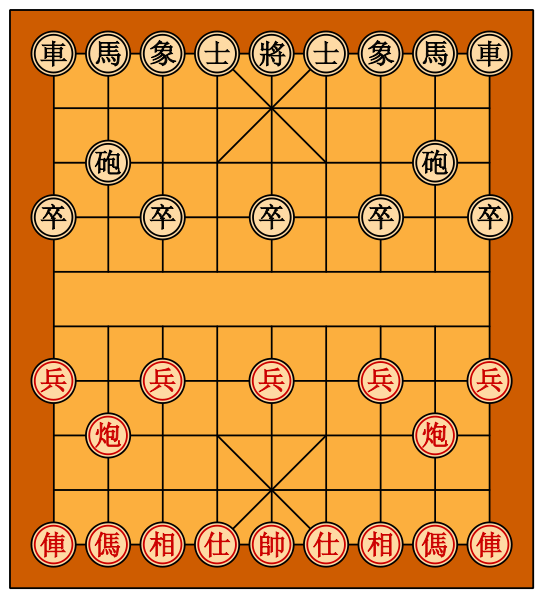
Chinese chess, more properly known as xiàngqí, is a very old game. Along with chess, it's from a family of games that appears to originate in India, but references to it date back to the Warring States Period, which ended with the beginning of the Qin Dynasty in 221 BC.
I know almost nothing about this game, alas! Each side has a general, two advisors, two elephants, two horses, two chariots, two cannons and five soldiers. Different pieces can move in different ways, and the goal is to capture the other side's general. A river runs across the board, and the elephants cannot cross this. So, it's akin to chess, but different.
The Wikipedia article on game-tree complexity says there are at most 10123 positions in the game tree for chess, but as many as 10150 for xiàngqí. For go, it says 10360. I like the idea of go.
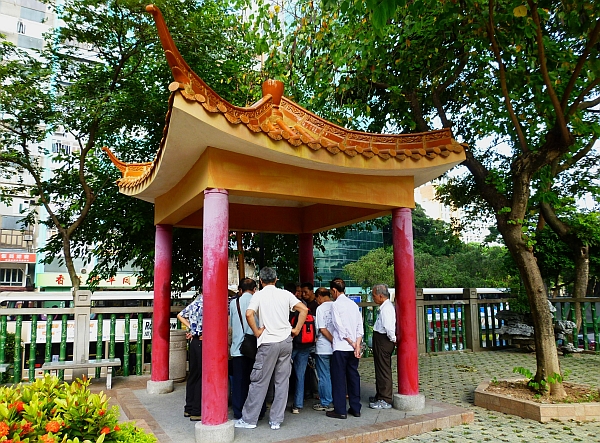
Hong Kong is the fourth most crowded country in the world. The Earth's land excluding Antarctica holds 50 people per square kilometer, but for Hong Kong it's about 6300. This is all the more impressive given how much of the land is forest-covered mountains. And Kowloon, the area where this photo was taken, the density soars to 43,000.
Nonetheless there are lots of nice little parks in Hong Kong, like this one in Ya Mau Tei near the Tin Hau temple. And while Chinese chess is popular among men in these parks, card games attract much bigger crowds. What games do they play? I don't know. Do you?
Which countries beat out Hong Kong? Macau, Monaco, and then Singapore! Interestingly, they all have pretty famous casinos.
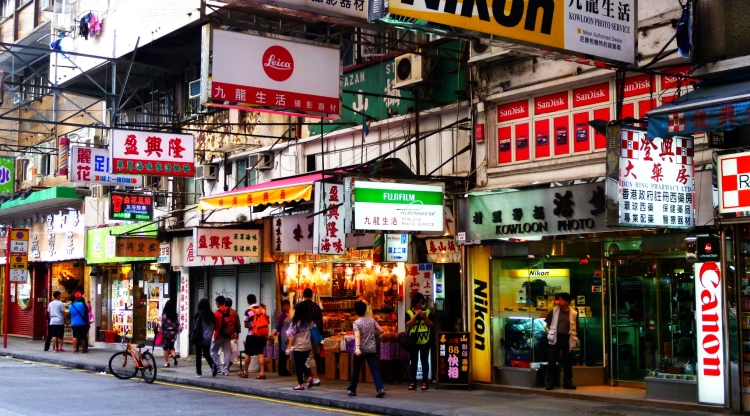
Hong Kong is full of brightly colored signs. At some point it goes past 'tacky' into a psychedelic realm all its own. If you've ever spent a lot of time out in the wilderness and suddenly returned to civilization, you'll know what a powerful effect these artificial colors have on us, though we quickly stop noticing. This is some street in Ya Mau Tei, the neighborhood with that charming temple I've been showing you. It's fun just to walk along and see all the strange things merchants are tempting you to buy.
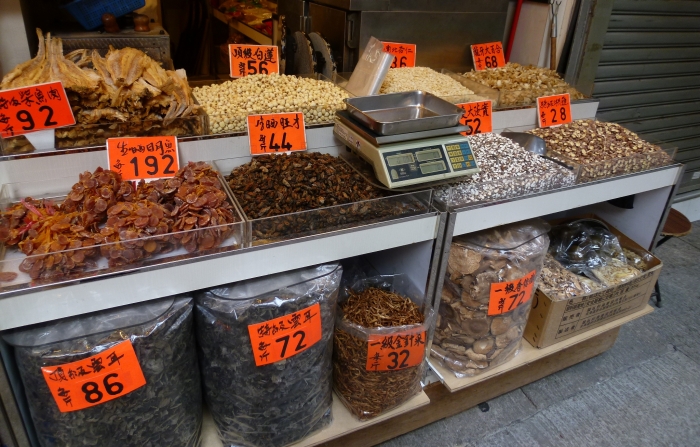
As I walked through the gaudy streets of Ya Mau Tei, I saw lots of products that remained mysterious to me due to my complete illiteracy. These look like fungi, dried fish and nuts of some sort. The shops selling traditional Chinese medicines are also full of strange substances. In the West we mainly hear about the use of endangered species like tigers, rhinoceri, black bears and the like... but there's also a cornucopia of medicinal plants and fungi, and these seem to predominate.
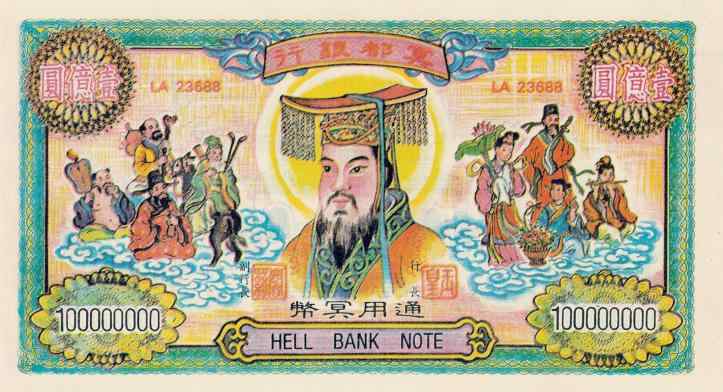
Both in Hong Kong and Singapore, hell bank notes are a popular form of spirit money. See this guy? I think he's the Jade Emperor, the king of heaven in religious Taoism... but the bills are often signed by Yanluo, King of Hell. Hell is not so bad in China: it's where we all go, and people down there (over there?) apparently need money just like us.
A good day for burning hell bank notes is Qingming, or Tomb Sweeping Day, 15 days before the spring equinox. According to the Wikipedia article:
The Qingming Festival is an opportunity for celebrants to remember and honour their ancestors at grave sites. Young and old pray before the ancestors, sweep the tombs and offer food, tea, wine, chopsticks, joss paper accessories, and/or libations to the ancestors. The rites have a long tradition in Asia, especially among farmers. Some people carry willow branches with them on Qingming, or put willow branches on their gates and/or front doors. They believe that willow branches help ward off the evil spirit that wanders on Qingming.On Qingming people go on family outings, start the spring plowing, sing, and dance. Qingming is also the time when young couples start courting. Another popular thing to do is to fly kites in the shapes of animals or characters from Chinese opera. Another common practice is to carry flowers instead of burning paper, incense or firecrackers.
I recently bought some hell bank notes in Singapore that looked more like American money. The figure is still the Jade Emperor, but under him it says 'Hamilton', just as on the $10 bill. Peculiar!
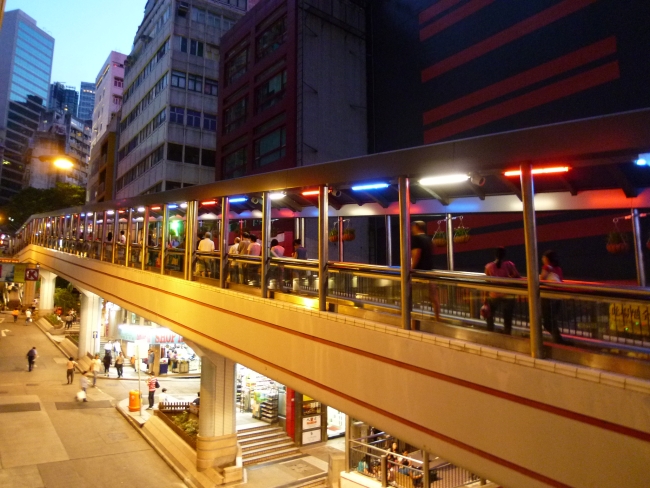
Hong Kong Island is very hilly. So they built the Central–Mid-levels escalators: the longest outdoor covered escalator system in the world. It takes you from the main downtown subway station up through the fashionable Mid-levels area, which is packed with restaurants, bars and fancy boutiques... but also little alleys and shops left over from the old days. The ride going up is 20 minutes. Down, you have to walk. Either way, it's a nice refuge from the rain: unlike Singapore, Hong Kong is not dominated by covered walkways.
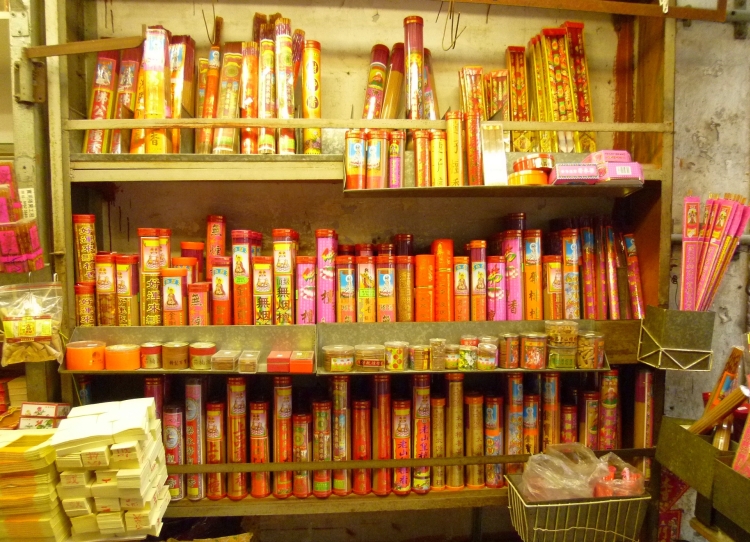
Pick your incense! This little store in the Central district of Hong Kong Island has plenty of kinds. But see those stacks of paper at front left? That's spirit money, also known as ghost money or joss paper. In China and Vietnam, people burn it for their ancestors. According to the Great Encyclopedia of All Knowledge:
The goal of ancestor worship is to ensure the ancestor's continued well-being and positive disposition towards the living and sometimes to ask for special favours or assistance. Rituals of ancestor worship most commonly consist of offerings to the deceased to provide for their welfare in the afterlife which is envisioned to be similar to the earthly life. The burning of spirit money enables the ancestor to purchase luxuries and necessities needed for a comfortable afterlife.
And as we'll see, it's not just money that get burnt: paper versions of all sort of modern luxury goods are also popular!

Here's a different side of Hong Kong: a view taken from near the western tip of the island. No fancy image processing — the sunset really looked like this! We were visiting some friends who work at the University of Hong Kong, and their apartment overlooks the West Lamma Channel. Despite the romantic lighting, Hong Kong is one of the world's busiest ports. Only Shanghai and Singapore ship more containers. This is a big reason these cities are doing so well economically.
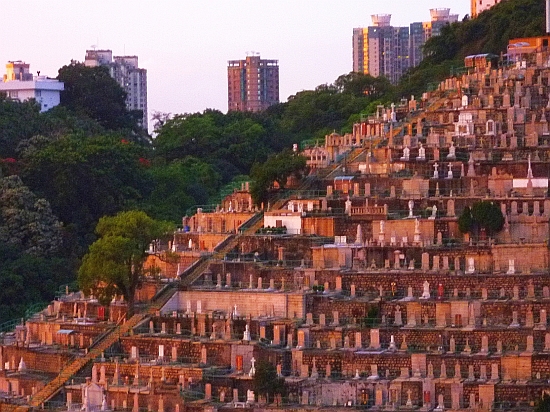
Looking in another direction we could see a big cemetery. The dead,
like the living, are tightly packed in Hong Kong.
May 17, 2012
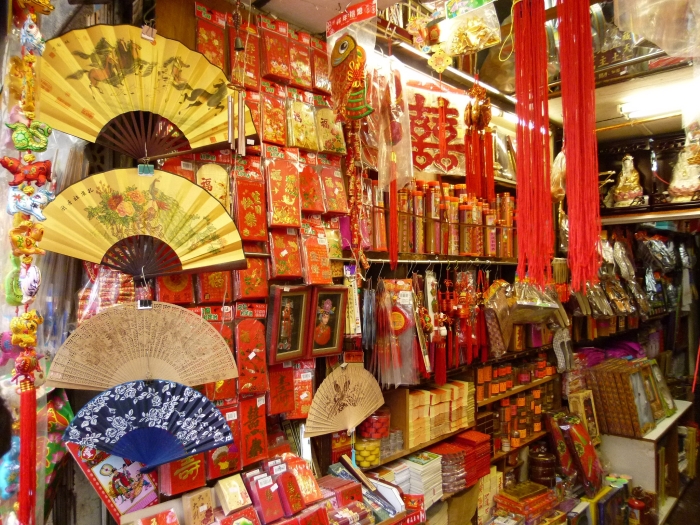
Lisa and I bought new laptops up in Wong Tai Sin, across the harbour from Hong Kong Island. We also wandered around a bit. Fans, incense, some golden Buddha statues... what else does this little shop provide? In red near the top you'll see the double happiness symbol, pronounced shuangxi, which is commonly used for New Year's decorations, weddings and similar occasions. And see all those red envelopes? These are called hˇngbao. They're used for gifts of money on these occasions. The red color symbolizes good luck and is supposed to ward off evil spirits. There might be something to this ... or maybe not: this article reports on the long controversy over whether sports teams who wear red are more likely to win, and if so, whether this correlation is due to causation. Anyway, the Chinese use a lot of red.
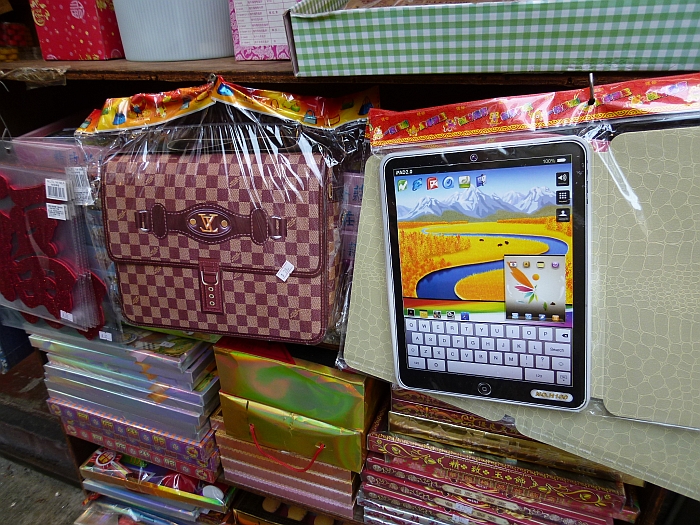
You always suspected it, and now you know: they use Ipads in hell. This handsome model from a shop in Wong Tai Sin is made of paper, so you can burn it and have it ascend to your ancestors. There's an enormous range of paper goods like this: designer purses, shoes, and so on.
© 2012 John Baez
baez@math.removethis.ucr.andthis.edu